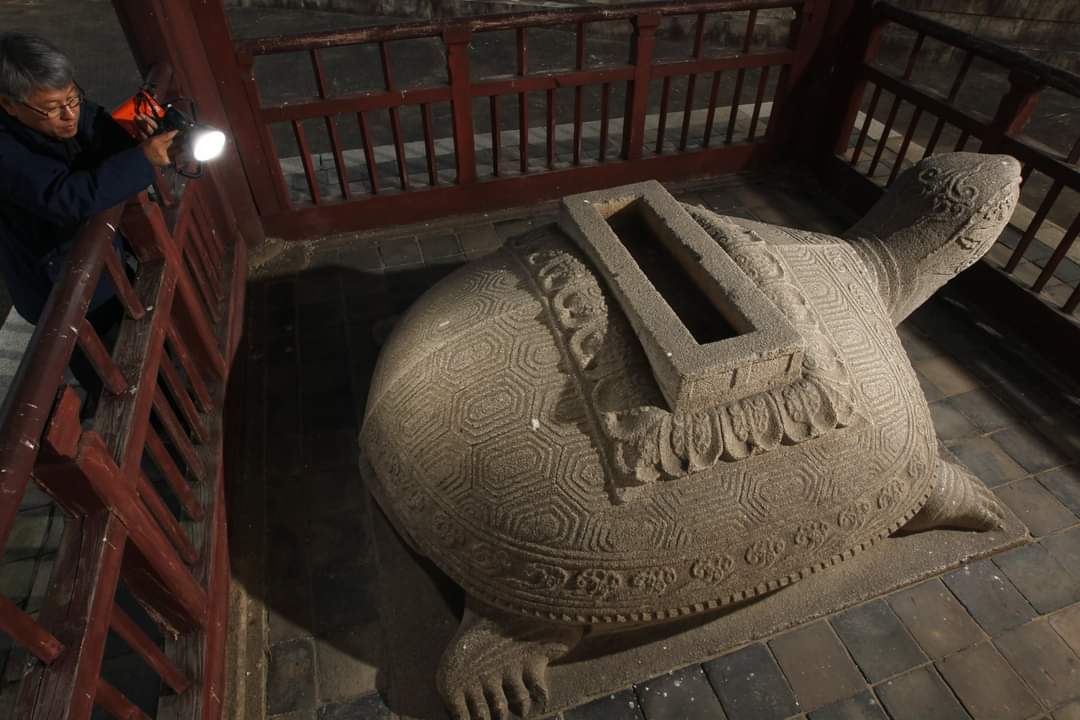
전업 사진작가를 조명 보조로 쓰는 전직기자는 아마도 내가 처음이 아닐까 한다.
바람 쐬러 내려온 경주. 나는 경주를 사랑하지만, 경주가 나를 사랑하는지는 아지 못한다. 하지만 경주가 좋은 이유는 따뜻한 사람이 많아서다. 아마도 근자에 나를 둘러싼 착찹함을 달래려 하는 나를 좋아하는 어떤 경주 사람의 소행이요, 선물이라 나는 믿는다.
김인문 묘비의 일부로 알려진 서악동 귀부龜趺. 태종무열왕릉 전면에 위치한 이 귀부가 헌사하는 주인공은 김인문이 아니라 그보다 더 유명한 일세의 영걸 김유신이라는 주장 또한 근자에는 비교적 설득력 있게 제기되는 실정이다. 누가 비문은 바수어 버렸을까?
비문은 바스라져 사라지고, 그 받침돌인 귀부만 남은 데가 한두 군데가 아니다. 혹자는 이를 임진왜란 당시 일본군의 소행이라 한다. 하지만 내가 늘 주장하듯이, 일본놈들이 하릴이 없어 남의 비문이나 두들겨 패겠는가? 임진왜란에 막대한 피해는 봤을 수도 있다. 하지만 귀부는 멀쩡한데 비문만 사라진 이유는 딴데서 찾아야 한다.
지금은 귀부와 비신碑身, 그리고 머릿돌인 이수螭首까지 다 요구하는 시대다. 이를 고려할 때, 비신만을 요구하는 시대가 바로 비신이 사라지는 이유인 것이다. 비신은 무엇인가?
그 사람의 생전 행적을 기록한 문서다. 이 문서는 대개 문장이 유려하고, 글씨 또한 당대를 대표하는 명필이 쓰기 마련이라, 이에 바로 비문만이 산산이 가루가 되어 사라진 이유가 있는 것이다.
그것은 바로 탁본이다. 탁본을 요청하는 시대가, 바로 비문이 사라진 이유다.
(2015. 12. 2)
****
Tortoise-shaped Pedestal in Seoak-ri, Gyeongju 경주 서악동 귀부 慶州西岳洞龜趺
This tortoise-shaped pedestal, located south of the Tomb of King Muyeol in Seoak-ri, is thought to be the pedestal for the stele erected to commemorate the life and achievements of Kim In-mun (629-694) of Silla, judging from Samguk sagi (History of the Three Kingdoms) and the inscription on the fragments of the stele found near the north prop of Yeonggwiru Pavilion at the Seoakseowon Confucian Academy.
The pedestal’s stout feet securely support the weight on the stone base. The five-line folds on its neck are expressed naturally and realistically.
The large hexagonal design carved on its back shows excellent workmanship.
The back of the tortoise is engraved with cloud and stringed bead patterns. A rectangular hole, into which the main body of the stele was thought to be inserted, is situated in the middle of the pedestal.
This tortoise-shaped pedestal matches in technique and detail that of the stele for King Muyeol (except that the tortoise’s feet have five toes).
Judging from the stylistic changes made to the pedestals of steles, the tortoise head was replaced with a dragon's head around the 9th century.
Preserved in its original form, this tortoise-shaped pedestal in Seoak-ri is an archetypical one, and is estimated to have been erected around the mid-7th century during the early Unified Silla Period.
'문화재현장' 카테고리의 다른 글
| 체험하는 국립항공박물관 (0) | 2020.12.02 |
|---|---|
| 항공업계 종사자들이 만들어가는 국립항공박물관 (3) | 2020.12.02 |
| 2013년 文文 학술대회 보도자료 (0) | 2020.12.01 |
| 시험문제 사전누출? 안성 칠장사의 어사 박문수 합격다리 (0) | 2020.11.30 |
| 황홀惶惚 (0) | 2020.11.29 |




댓글